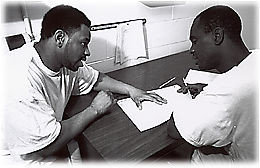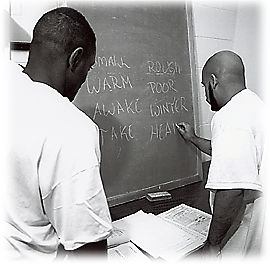| |  | | | L.I.F.E.
Program Facts | | | •
The program was established in 1985.
•
Purpose is to teach illiterate inmates how to read and write in one-on-one tutor
sessions with volunteer inmate tutors. •
First program of its kind in New Jersey prison system to use community and prisoner
volunteers to tutor students and manage program. •
The program is solely managed by inmates and all tutors are inmates. •
All inmate tutors are trained and LVA-certified.
•
Inmate tutors are also trained to recognize learning disabilities and modify their
instruction with additional training by ABC
Literacy Resources. •
There are currently 46 active tutors and 44 students. •
The L.I.F.E. program to date has taught 236 students who have reached their goal
of ability to read a book, ability to read to their children, and ability to read
letters from home. •
52 students have obtained a GED. •
In 1990, President George Bush named The L.I.F.E. Program as one of the Thousand
Points of Light which promoted volunteerism by recognizing role models throughout
the country. |
The
L.I.F.E. Program (Learning Is For Everyone) at the New Jersey State Prison
was established in 1985 in response to the needs of a growing illiterate inmate
population. It is estimated that 75% of the inmates at New Jersey State Prison
are illiterate or functionally illiterate reading below a fourth grade level.
With prison education programs losing financial support, founder and community
volunteer William Burke realized the need for a corps group of community
volunteers, educators and inmates to work together towards the common goal of
increasing literacy within prisons: "I
recognized the staggering illiteracy rate in the prisons and realized that a lot
of these guys carry a stigma about their inability to read. I thought that a one-on-one
tutor session with another inmate would give them the confidentiality needed to
encourage them to come back to school. I also know there is a lot of talent in
the prison population and the men could run this program themselves. All I had
to do was ask the inmates and they jumped at the offer."
Now
after seventeen years, this unique inmate-run program has successfully improved
the literacy skills of 236 men and has allowed them to either acquire a GED certificate,
have the ability to read a book to their children or letters from home. Assistant
Program Manager Gene Berta emphasizes the program's goals: "If
you can't read, you can't function. The guys realize this and they're tired of
asking friends for help reading letters or writing home...A lot of guys can't
go into the law library and work on their case to try to get themselves either
a reduced sentence or an appeal process because they can't read."
The
success of the L.I.F.E. program is due to the involvement of the inmates and their
sense of ownership of the program. Inmates volunteer to tutor their fellow inmates
for a two-hour session once a week. Each tutor is trained and certified by the
Literacy Volunteers
of America (LVA) as a certified reading instructor. LVA educators Robert
and Anne McCleery hold classes to instruct inmate tutors on the best methods of
instruction for adult literacy students. The L.I.F.E. inmate managers then match
these tutors with students to begin their tutor-student sessions. Anne McCleery,
LVA educator, affirms: "My
husband and I teach in many prison literacy programs and often see those programs
dissolve. The L.I.F.E. Program is unique because the men are very dedicated and
manage a consistently high quality program that has lasted these many years."
 One
of the unique aspects of the L.I.F.E.. Program is its recognition of learning
disabilities among its students. The American prison population has a four times
greater percentage of learning-disabled individuals than the general population.
Although Learning Volunteers of America train the inmate-tutors with skills needed
for reading instruction, a more specialized training using multisensory strategies
is needed to teach the learning-disabled student. Volunteers from ABC
Literacy Resources conduct additional tutor-training sessions to help them
identify strengths and deficiencies in their students and to become skilled teachers
of the Orton Gillingham-based instruction. Elaine Phillips, one of the
founders of ABC Literacy Resources, states: One
of the unique aspects of the L.I.F.E.. Program is its recognition of learning
disabilities among its students. The American prison population has a four times
greater percentage of learning-disabled individuals than the general population.
Although Learning Volunteers of America train the inmate-tutors with skills needed
for reading instruction, a more specialized training using multisensory strategies
is needed to teach the learning-disabled student. Volunteers from ABC
Literacy Resources conduct additional tutor-training sessions to help them
identify strengths and deficiencies in their students and to become skilled teachers
of the Orton Gillingham-based instruction. Elaine Phillips, one of the
founders of ABC Literacy Resources, states:
"With
such disproportionately high numbers of inmates with learning disabilities such
as dyslexia, it is vital that we give these inmate tutors the skills to recognize
the impediments affecting their students learning."
The
benefits to the New Jersey State Prison community are numerous. Not only are inmates
improving their literacy skills, but also the program provides a cost-effective,
purposeful prisoner activity and gives inmates working as tutors the chance to
spend their time in a positive, supportive role while using organization and management
skills. Over the years, the L.I.F.E. Program has come under the authority of three
prison administrations that have recognized its value to the individual men. Prison
Administrator Roy Hendricks recently commented:
"This institution is geared more towards compliance … Inmates are
doing 50, 100, 300 years. If an inmate goes to school over a period of time, he
begins to feel better about himself and the number of disciplinary charges he
incurs are significantly reduced…We depend on our volunteers to provide positive
programming for the men here at New Jersey State Prison."
Over
the past seventeen years, the program has had 136 tutors and 236 students who
have reached their personal goals of obtaining a GED, enrolling in school, reading
a book, reading to their children or reading letters from home. One student received
his GED and then became a tutor in the program. Program Manager William Brown
states:
"We've had students who couldn't read or write and after completing the
program, they got their GED. For us, that's a success story."
 The
L.I.F.E. Program was the first literacy program in the New Jersey prison system
to use community and prisoner volunteers and has become a model for other literacy
programs. The Program continues to tutor 44 students with 46 tutors and has a
wait list for both new tutors and students. The L.I.F.E. managers have also assisted
fellow Hispanic inmates to establish H.E.L.P. (Hispanic Education Literacy Program),
a Hispanic literacy program. The managers have published a detailed manual with
instructions and suggestions on managing the specifics of the program, recruiting
tutors and community volunteers, fund-raising and publicity, and maintaining a
relationship with prison officials. It is the hopes of the founders and managers
that other correctional institutions will establish their own inmate-run literacy
program. The
L.I.F.E. Program was the first literacy program in the New Jersey prison system
to use community and prisoner volunteers and has become a model for other literacy
programs. The Program continues to tutor 44 students with 46 tutors and has a
wait list for both new tutors and students. The L.I.F.E. managers have also assisted
fellow Hispanic inmates to establish H.E.L.P. (Hispanic Education Literacy Program),
a Hispanic literacy program. The managers have published a detailed manual with
instructions and suggestions on managing the specifics of the program, recruiting
tutors and community volunteers, fund-raising and publicity, and maintaining a
relationship with prison officials. It is the hopes of the founders and managers
that other correctional institutions will establish their own inmate-run literacy
program.
The
program depends on financial assistance from grants and private sources. This
has allowed the program to remain financially independent, thus relieving New
Jersey State Prison of the fiscal responsibility for the program. By receiving
these donations, the L.I.F.E. Program has been able to successfully continue its
mission. Anyone
interested in making a donation to support
the program can make checks payable
to
"L.I.F.E. Program, New Jersey State Prison" Mail
to:
Peter
Ronaghan, Business Manager
Business Office
New Jersey State Prison
P.O.
Box 861
Trenton, NJ 08625-0861
The
managers of the L.I.F.E. Program have prepared
a manual for those interested
in starting an inmate-run literacy program
in correctional institutions. To
receive a manual free of charge
or to contact members of the program, write
to: L.I.F.E.
Program
c/o William Brown, Program Manager
77729-187619A
New Jersey
State Prison
P.O. Box 861
Trenton, NJ 08625-0861
|